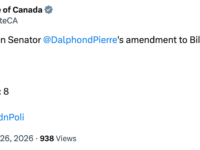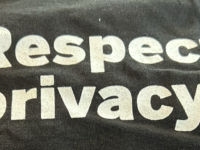Faced with a bill that would leave political parties subject to weaker privacy rules than virtually any other major organization in Canada, the Senate voted yesterday to amend the bill by including a sunset clause on the privacy provisions that gives that the government three years to come up with something better. The change is designed to allow the new rules, which as the Senate heard repeatedly from experts and privacy commissioners are not real privacy rules at all, to apply immediately but expire in three years. This will have the effect of killing a B.C. privacy challenge that sparked the legislation in the first place. The bill heads back to the House of Commons, where the government can either accept the change and have the bill pass or reject the change and send it back again to the Senate. If it is sent back, the Senate is unlikely to oppose the privacy elements in the bill again.
Post Tagged with: "c-4"
Time for the Government to Fix Its Political Party Privacy Blunder: Kill Bill C-4’s Disastrous Privacy Rules
Just weeks after last year’s election, Mark Carney’s government committed not one, but two privacy blunders in rapid succession. First, Bill C-2 – literally the first substantive bill of the new government – buried lawful access provisions in an omnibus “border measures” bill that would have established unprecedented warrantless access to the personal of information of Canadians. Second, days later it introduced Bill C-4, which was framed as affordability measures bill but included provisions that exempt political parties from the application of privacy protections. The bizarre assault on privacy felt like an opportunistic attempt to insert unpopular rules in the hope that few were paying attention. The strategy was failure: the government ultimately introduced a new border measures bill with lawful access removed (new lawful access rules are expected in their own bill this year) and now a Senate committee which studied the Bill C-4 privacy rules has recommended that they be killed, removed from the bill, or subject to a two-year sunset clause.
How the Liberal and Conservative Parties Have Quietly Colluded to Undermine the Privacy Rights of Canadians
It hasn’t received much attention, but the government and official opposition – ie. the Liberals and Conservatives – have been quietly working to pass legislation that undermine the privacy rights of Canadians, effectively exempting themselves from the privacy rules imposed on everyone else. As I highlighted in June, Bill C-4 was promoted as “affordability measures” bill but it also includes provisions that exempt political parties from the application of privacy protections. The provisions, which come toward the end of the bill, are deemed to be in force as May 31, 2000, meaning that they retroactively exempt the parties from any privacy violations that may date back decades. The House of Commons Standing Committee on Finance wrapped up its study of the bill last week and incredibly it refused to hear from any witnesses that would speak to the issue. In fact, despite concerns raised in briefs from the Privacy Commissioner of Canada and the Commissioner of Elections, the committee (consisting almost entirely of Liberal and Conservative MPs) limited its discussion of an entire section of the bill to a thirty second description of the provisions from a government official. No witnesses, no debate, no acknowledgement of concerns raised by experts. It was as if the provisions do not exist.
The Law Bytes Podcast, Episode 237: A Conversation with Jason Woywada of BCFIPA on Political Party Privacy and Bill C-4
The government’s unexpected privacy reform agenda includes both lawful access in Bill C-2 and the evisceration of political party privacy in Bill C-4. While Bill C-4 is framed as implementing affordability measures, it also exempts political parties from the application of privacy protections on a retroactive basis dating back to 2000.
To examine the importance of political party privacy and the implications of Bill C-4, I’ve teamed up this week with the BC Freedom of Information and Privacy Association for a joint podcast. Together with Executive Director Jason Woywada we recorded a conversation that touches on data and political parties, the BC litigation that seems to have sparked federal action, and the Bill C-4 provisions. The conversation can be found on both of our podcasts: this Law Bytes episode and BC FIPA Access and Privacy Online podcast.
Government Reverses on Privacy and the Charter: Department of Justice Analysis Concludes Political Party Privacy Bill Raises No Charter of Rights Effects
The Department of Justice has released its Charter Statement for Bill C-4, the affordability measures bill that also exempts political parties from the application of privacy protections on a retroactive basis dating back to 2000. The provisions give political parties virtually unlimited power to collect, use and disclose personal information with no ability for privacy commissioners to address violations. Charter statements are designed to identify Charter rights and freedoms that may potentially be engaged by a bill and provide a brief explanation of the nature of any engagement, in light of the measures being proposed. The Bill C-4 Charter statement is notable for its brevity:
The Minister of Justice has examined Bill C-4, An Act respecting certain affordability measures for Canadians and another measure, for any inconsistency with the Charter pursuant to his obligation under section 4.1 of the Department of Justice Act. This review involved consideration of the objectives and features of the Bill. In reviewing the Bill, the Minister has not identified any potential effects on Charter rights and freedoms.











